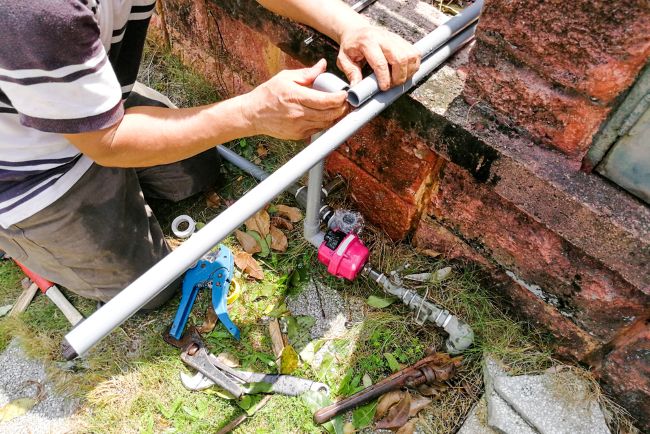Outdoor Kitchens, Taps, and Garden Features

Smart Plumbing for Your UK Garden
Dreaming of a fantastic garden with an outdoor kitchen, a handy tap, or even a relaxing hot tub? You’re not alone! More and more people in the UK are making their gardens extra special. But before you get too excited about the fun stuff, it’s super important to think about the plumbing. Getting it right from the start means your garden features will work well, save water, and avoid costly problems down the line.
Did you know that a single garden sprinkler can use a massive 1,000 litres of water per hour? That’s about 16 litres every minute! This figure, shared by Anglian Water via Homebuilding & Renovating, shows just how much water can be used in the garden. With this in mind, smart plumbing isn’t just about convenience; it’s about being water-wise too.
“As more homeowners add garden rooms and outdoor kitchens, we focus on two things: water efficiency and reliability,” says Lee Devlin, Director at Homecure Plumbers, who provide professional plumbing services in London. “A frost-proof tap with an internal isolator and a simple double-check valve solves most headaches before they start — and pairing taps with drip irrigation instead of a sprinkler protects pressure and saves water.”
Outdoor Taps That Won’t Let You Down
A garden tap is a must-have, but not all taps are created equal. In the UK, our winters can be chilly, so a standard indoor tap outside can freeze and burst, causing a big mess and an expensive repair.
What to look for:
- Frost-proof taps: These taps are designed so that the water shuts off inside your warm house, not outside. This means there’s no water left in the exposed pipe to freeze.
- Isolation valve: This is a small lever or knob inside your house that lets you turn off the water to your outdoor tap without affecting the rest of your home. Handy for winter!
- Double-check valve: This small device stops dirty garden water from flowing back into your clean drinking water supply. It’s a simple but important safety feature.
Outdoor Kitchens: Plumbing for Al Fresco Dining
An outdoor kitchen can be the heart of your garden, but it needs proper plumbing for a sink and any appliances.
Plan plumbing before paving: set your water supply for taps and waste routes first, then lay the patio with proper falls and a channel drain. It’s cleaner, safer and far cheaper than retrofitting.
Key plumbing points:
- Drainage: Just like an indoor sink, an outdoor sink needs to drain away wastewater. This usually means connecting to your home’s drainage system. You’ll also need a trap under the sink to stop smells.
- Grease management: If you’re washing greasy BBQ tools, consider a small grease trap to prevent blockages in your drains.
- Water supply: You’ll need a cold water feed, and possibly a hot water feed if you want a fully functional outdoor kitchen. Make sure all pipes are properly insulated and protected from frost.
Hot Tubs, Outdoor Showers, and Water Features
These additions can turn your garden into a luxury retreat, but they come with specific plumbing needs.
- Hot tubs: These require a dedicated water supply for filling and a way to drain them for cleaning. Proper electrical installation is also crucial, and it should always be done by a qualified electrician.
- Outdoor showers: Great for rinsing off after gardening or a swim. Ensure they have good drainage and consider a simple mixer tap for warm water. Again, frost protection is key.
- Water features: From small fountains to larger ponds, these often involve pumps and filtration systems. Make sure the electrical supply is safe and waterproof, and that any top-up water supply has backflow protection.
Smart Watering: Drip Beats Spray
Remember that stat about sprinklers using 1,000 litres an hour? There are much more efficient ways to water your garden.
- Drip irrigation: This system delivers water slowly and directly to the roots of your plants, where it’s needed most. It uses far less water than sprinklers and reduces evaporation.
- Water butts: Collecting rainwater in a water butt is a fantastic way to get free, natural water for your plants. You can even connect a hose to some water butts for easier watering.
- Hydro-zoning: This is a fancy term for grouping plants with similar water needs together. This way, you don’t overwater some plants while underwatering others.
We hope these tips have been helpful. For any complex installations, repairs, or if you’re unsure about UK water regulations, it’s always best to call in the professionals.


